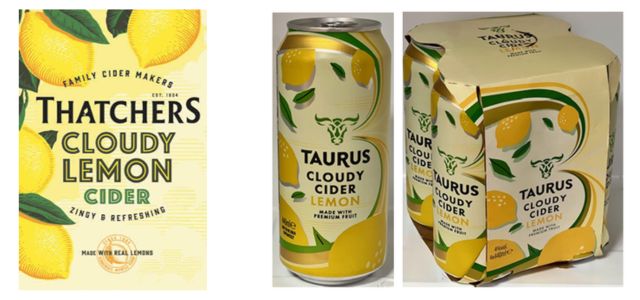Would you confuse the below cider drinks? This was considered in a recent claim brought by Thatchers regarding its Thatchers Cloudy Lemon Cider against Aldi regarding its Tauras Cloudy Cider Lemon in the Intellectual Property Enterprise Court. As explained below, Aldi successfully defended the claim.

(Images taken from Thatchers Cider Company Limited v Aldi Stores Limited [2024] EWHC 88 (IPEC) of the Thatchers trademark (left) and Aldi’s alleged lookalike product (right))
Trademark infringement
Thatchers had a registered UK trademark (a device mark) for the front of its packaging for “cider” and “alcoholic beverages except for beer.” It alleged trademark infringement by Aldi on two grounds:
Likelihood of confusion
Aldi’s packaging was similar to Thatchers trademark and had been applied to identical or similar goods such that there was a likelihood of confusion.
Reputation
Thatchers’ trademark had a reputation in the UK, and a link would be made between the Aldi packaging and Thatchers’ mark so consumers would buy Aldi’s cider. Thus, Aldi’s use would take unfair advantage of – or cause detriment to the distinctive character or repute of – Thatchers’ trademark.
The court held as follows:
Likelihood of confusion
There was no likelihood of confusion between the overall appearance of the Aldi product and Thatchers’ trademark, and they were similar to a low degree. For example, the brand names ‘Thatchers’ and ‘Taurus’ were different, and there were other elements on Aldi’s packaging differentiating it, such as a bull’s head.
Some points of similarity were descriptive, for example, the words “cloudy lemon cider” and “cloudy cider lemon”, or commonplace for lemon-flavored drinks on the market, for example, the use of lemons, leaves, and the color palette.
It was also taken into account that there was no evidence of actual customer confusion.
Reputation
Although Thatchers’ trademark had a reputation in the UK, there was a low degree of similarity between the Aldi product and Thatchers’ trademark. While a link could be made, Aldi’s packaging did not take unfair advantage of Thatchers’ trademark and did not damage its reputation.
In relation to the detriment of Thatchers’ reputation, the judge carried out a ‘blind taste test,’ concluding that the ciders tasted similar. Therefore, if the products were associated, the Aldi product was not of such an inferior quality as to negatively impact Thatchers’ cider.
Passing off
For passing off, Thatchers had to show that it had goodwill in the cider under its mark, which it launched in February 2020, and that Aldi’s use of similar packaging, which it launched in May 2022, was a misrepresentation to consumers. Thus, this misrepresentation would result in consumers being deceived into believing there was a commercial relationship between the products/brands and there was damage as a result.
The court held that it was unlikely that consumers would be misled into thinking that there was a commercial link between Aldi and Thatchers or its respective products. There was no evidence that consumers thought that Aldi’s cider was that of Thatchers (or that Thatchers had a license or manufacturing arrangement with Aldi).
Takeaway points
- There may be ways of protecting various features within a product in different ways.
- It is possible to obtain a trademark for packaging if it is shown in a way that allows the subject matter to be determined clearly and precisely. However, such trademarks can be more difficult to obtain than more traditional trademarks and may fall more within copyright or design protection.
- This is an example of potential difficulties in relying on a trademark for packaging – even where a brand has a well-established reputation – or for the goodwill that you may have in such packaging (for passing off).
- It may be helpful if a claimant can produce evidence of actual consumer confusion or deception.
- Interestingly, Aldi acknowledged it had “benchmarked” its cider against Thatchers’ cider and instructed its product designers to create a “hybrid of Thatchers and Taurus.” Benchmarking is standard across the industry and – as is clear from the judgment – this did not prejudice Aldi in the judge’s mind nor necessitate a finding of infringement.

Written by Scott Steinberg
Senior Associate, Fox Williams

Written by Charlotte Kong
Associate, Fox Williams
You may also like…
UEFA partners with Alliance for Creativity and Entertainment to enhance global anti-piracy strategy
October 21, 2025 - The Union of European Football Associations (UEFA) has officially joined the Alliance for...
EUIPO and UANIPIO welcome the integration of Ukraine’s trademarks into TMview
The European Union Intellectual Property Office (EUIPO) and the Ukrainian National Office for Intellectual Property...
Jägermeister succeeds in opposing the EU trademark application Alten Kräuterfrau for alcoholic beverages
Mast-Jägermeister SE filed an opposition on the grounds of Article 8(1)(b) – likelihood of confusion between the signs...
Contact us to write for out Newsletter













